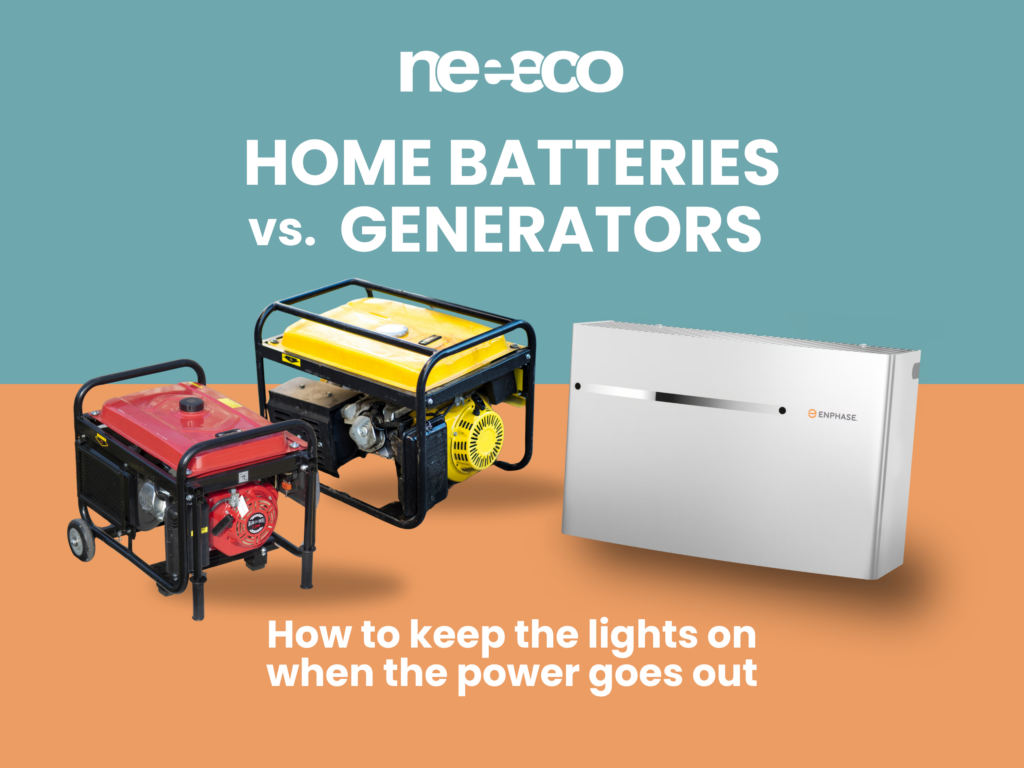
When your power goes out, what do you do?
Hopefully, not much – if you have a ready source of backup power, you can carry on with your day fairly easily. But if you don’t have a backup and want to install one, you need to ask a few key questions:
- How often do you lose power – or expect to lose it in the future?
- How long do you expect outages to last?
- How important is clean energy and long-term savings vs. up-front cost?
Generators have been the traditional go-to for home backup energy, but electrical batteries are gaining popularity as they become more powerful and readily available. Here’s how to decide what’s best for your home.
Generator Basics
Generators are powered by gasoline, natural gas, propane, or diesel. You can either buy a portable generator and install it yourself, or hire a contractor or electrician to professionally install an automatic standby generator.
Automatic standby generators are permanent and located outdoors, and they turn on as soon as the electricity in your house goes out. You may need to refuel the tank yourself, but many generators are connected to your local natural gas supply and don’t require action from you.
Portable generators are available for a few thousand dollars at a typical U.S. retailer. They require you to manage fuel and extension cords, however – if you don’t have fuel on hand during an outage, you’ll have to source some, probably in less-than-ideal circumstances. Most importantly, portable generators put you at significant risk for carbon monoxide poisoning. Carbon monoxide from generators kills about 100 people annually in the U.S., and non-fatally poisons even more.
Battery-Powered Backup Basics
In contrast to a generator powered by fossil fuels, home batteries store electricity from either your solar panels or the electrical grid for you to access when the grid goes offline.
If you have solar panels, you’re likely connected to your local electrical grid in a net-metered system – meaning that you contribute excess power to the grid, but get charged when you pull more electricity from the grid than you generate. With a solar-powered battery system, you store your excess solar electricity, and use that to power your home instead of drawing more from the grid when necessary. If the grid fails for any length of time, that same battery keeps your house powered during the outage.
You don’t need solar panels to use a battery system, however. Home batteries that charge from the electrical grid can patch directly into your electrical panel, drawing and storing power from the grid for you to use if the grid goes down. In either case, you should hire an electrician to install batteries to ensure proper functioning.
Practical Considerations
So, what option is best for your home? Think about immediate costs, long-term costs, and various practical requirements for each type of system. You’ll also want to think through quality-of-life issues like noise and exhaust.
Generators
Pros:
- You can refuel generators during prolonged power outages, so as long as you can source fuel, you’ll have power.
- Lower up-front cost can help you get backup power installed relatively quickly.
Cons:
- They are often noisy, although this depends on how large and what type of brand you use/install.
- Portable generators can be dangerous, and even automatic standby generators create emissions that can be damaging to local air quality.
- They require regular maintenance – for a portable generator, you need to do regular oil changes and clean the filter. For an automatic standby generator, a technician should do an annual inspection to ensure it’s running properly.
Electrical Batteries
Pros:
- Lower maintenance costs – generators require regular servicing and repairs, but your battery is much easier to deal with after it’s installed.
- No need to worry about sourcing fuel.
- Powered by clean energy, so no emissions or air quality problems.
- Overall costs can be lower long-term, depending on electric rates vs fuel costs over time.
- Some solar panel-charged batteries cannot recharge while the grid is offline, but there are some alternatives. For example, Neeeco offers the Enphase IQ Battery 10 – meaning that when you run out of stored power, you won’t be out of luck. This battery will recharge even if the grid is offline.
Cons:
- Up-front cost is higher, even with incentives.
Doing the Math: Wattage, Hours, Incentives, and More
To compare costs, start by assessing your home’s energy usage and how many hours you estimate you’ll need to run on backup power. Energy usage is measured in kilowatt hours (Kwh) – the amount of kilowatts consumed in an hour. An electrician can do an audit to help you arrive at a number, or you can review your electric costs (but be sure to look at costs across a variety of months, as summer usage can be higher for things like air conditioning).
Consider an estimate of how long you’ll need backup power – how long do outages typically last when the power goes out?
With those needs in mind, you can better understand how big a battery or generator you might need.
While generators haven’t evolved much lately, home batteries have seen big improvements over the past few years, so make sure you check in with electricians and contractors who keep up with the latest updates. Along those same lines, make sure you look into battery incentives you can access in your area.
In Review
- Start by getting your own Kwh usage and how many hours you think you’d need backup power.
- Consider your cost capabilities now vs. the long term – if you can afford a battery investment now, it may pay off in the form of lower long-term costs, especially if you have solar panels already.
- Keep quality-of-life details in mind, such as noise, emissions, need for refueling, and maintenance.
The next time the power goes out, you’ll be grateful you took the time to secure a backup. Always keep safety in mind for whatever option you choose – consult professionals and be careful to avoid fire or emission risks, and you’ll keep your home secure as well as comfortable.
Call (781) 309-7540 or contact us to schedule a no-cost home energy assessment and better understand your home’s energy needs!
